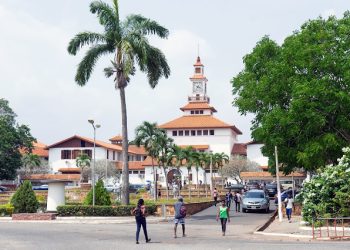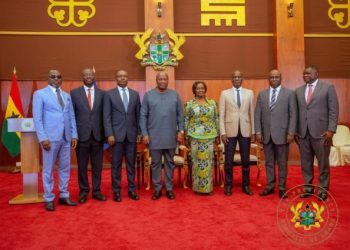The Ghana Water Company Limited (GWCL) posted a net loss of GH¢938.83 million for 2020.
This represents a 64.17% improvement on net loss of GH¢2.6 billion (GH¢2,620.35 million) posted in 2019.
Negative 70.02% net profit margin
Therefore, the net profit margin was negative 70.02% in 2020.
2020 State Ownership report
This was contained in the 2020 State Ownership report which shines the spotlight on the performance of entities in which the state has an interest, collectively referred to as specified entities (SEs).
SOEs, JVCs, OSEs, regulatory bodies, and public corporations
These entities comprise state-owned enterprises (SOEs), joint venture companies (JVCs) and other state entities (OSEs) such as regulatory bodies, and public corporations.
0.59% liquidity ratios
The report puts GWCL’s liquidity ratios at 0.48% for 2019 and 0.59% for 2020.
Liquidity position precarious
Despite an 11-basis point improvement in the ratio, the company’s liquidity position remains precarious and underscores its difficulty in meeting short-term obligations.
GH¢346.02m free cash flow in 2020
For 2020, free cash flow was GH¢346.02 million, representing an increase of 459.99% from negative GH¢61.79 million in 2019.
Net cash inflow increased to GH¢476.53m in 2020
This was mainly driven by the increase in net cash inflow from operating activities from GH¢97.96 million in 2019 to GH¢476.53 million in 2020.
GH¢4.2bn long-term loans as debt-to-equity ratio is 0.81%
According to the report, GWCL’s total long-term loans of GH¢4.2 billion (GH¢4, 2016.79 million) on its books in 2020 making debt-to-equity ratio for the period was 0.81%.
Revenue rose to GH¢1.3bn in 2020
Per the report, GWCL’s revenue increased by 44.83% from GH¢925.82 million in 2019 to GH¢1.3 billion (GH¢1,340.89 million) in 2020.
Sale of water rakes in GH¢1.3bn
Following the above trends, revenue from operations – sale of water – increased by 45.09% from GH¢901.96 million in 2019 to GH¢1.3 billion (GH¢1,308.63 million) in 2020.
56.82% sale of water to private customers
This was on account of a 56.82% increase in sale of water to private customers.
Total revenue up 34% per annum since 2017
Similarly, total revenue increased by an average of 34% per annum between 2017 and 2020.
Direct cost up by 13.89% to GH¢1.4bn
GWCL’s direct cost rose to GH¢1.4 billion (GH¢1,444.15 million) in 2020, representing a 13.89% increase from GH¢1.2 billion (GH¢1,268.02) million in 2019.
47.34% increase in distribution costs
The increase in direct cost was mainly on account of a 47.34% increase in distribution costs.
Direct cost consistently exceeded revenue since 2017
The report averred that it must be a matter of concern that the direct cost has consistently exceeded revenue by an average of 8% between 2017 and 2020.
Operating expenses dropped by 66.12% to GH¢747.99m
According to the report, operating expenses decreased by 66.12% from GH¢2.2 billion (GH¢2,207.53 million) in 2019 to GH¢747.99 million in 2020.
Exchange losses reduced to GH¢316.51m in 2020
The reduction was primarily driven by a reduction in exchange losses from GH¢1.7 billion (GH¢1,751.08 million) in 2019 to GH¢316.51 million in 2020.
2020 performance contract results
GWCL’s total weight score for 2020 performance contract was 2.70, which represents a below average performance based on the normalised five-point scoring scale.
On financial and economic, GWCL’s bottom line continues to show huge losses year by year.
Obsolete infrastructure, low tariffs, non-revenue water above benchmark levels, illegal connections, among many others, continue to bedevil the operations of the company.
Regarding the dynamic effects GWCL did not submit its plans and programmes on time but was able to indicate the levels of implementation of some of its plans and programmes.
In respect of management, improvement and project, most of the company’s plans and programmes were not submitted while others were submitted way beyond the deadline for submission.
The report, however, noted that the levels of implementation of projects were good.
Key operational results
According to the report, GWCL exceeded most targets set for the year due to the government’s free water supply policy.
Raw water abstracted in 2020 was 344 million cubic millimetre (mm3) exceeding a target of 328mm3
Water produced in 2020 was 325 million cubic metres (mm3) compared to the target of 312 million cubic metres.
Water sold in 2020 was 198 million cubic metres compared to the target of 161 million cubic metres.
Process loss was 5.7% as against a target of 5%
GWCL achieved GH¢6.82 out of the target (GH¢7.05) set for average water tariffs while collection ratio of 86.2% as against a target of 97% was achieved.
GWCL is a limited liability company that is responsible for the production and sale of potable water and supply of water to all urban communities in Ghana.
It was established in 1995 as Ghana Water and Sewerage Corporation (GWSC) and converted to a limited liability company in 1999 following the enactment of the Statutory Corporations (Conversion of Companies) Act, 1993 (Act 461).










